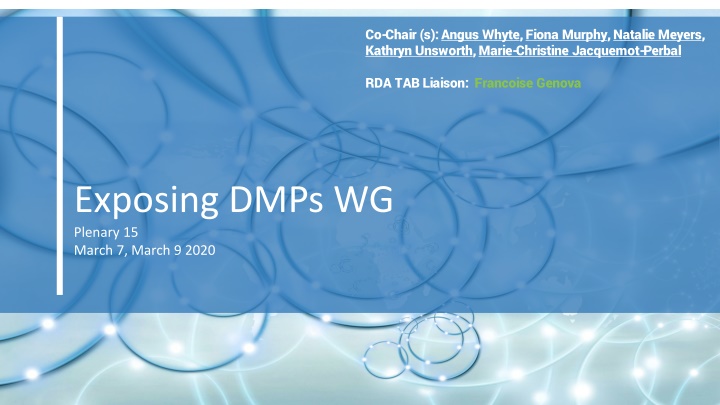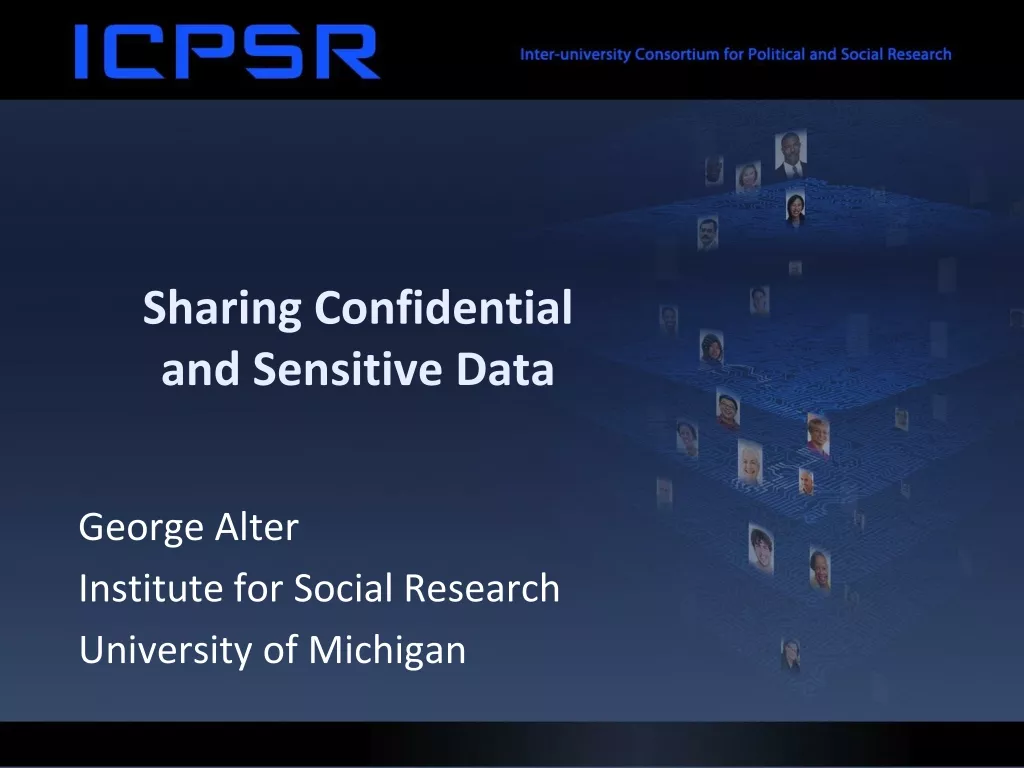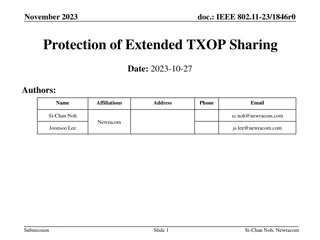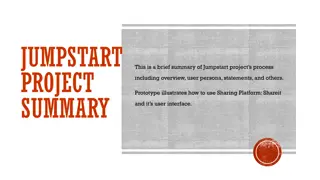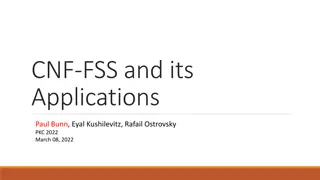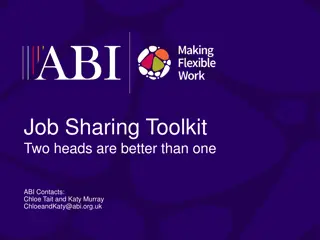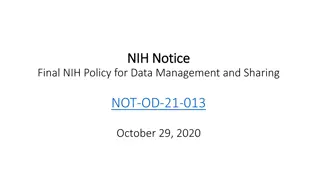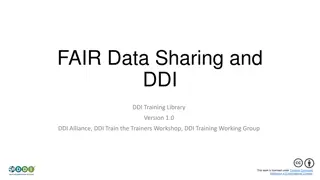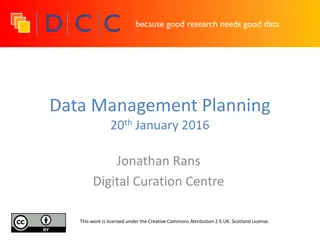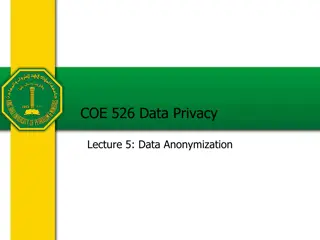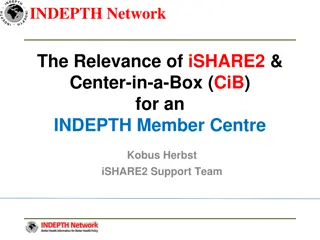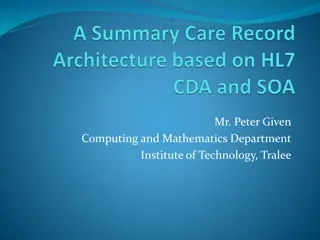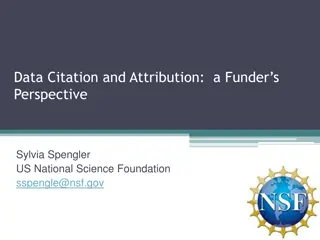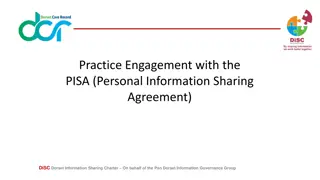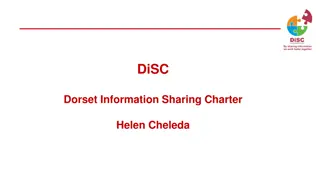Enhancing Data Management Practices with DMP Sharing
Proper sharing of Data Management Plans (DMPs) is crucial for improving research outcomes. This involves sharing DMPs at appropriate stages, enabling reuse, informing service delivery, and facilitating data discovery. The document discusses the importance of sharing DMPs early and openly, along with details on use cases, a survey, and recommendations for enhancing DMP practices.
Download Presentation

Please find below an Image/Link to download the presentation.
The content on the website is provided AS IS for your information and personal use only. It may not be sold, licensed, or shared on other websites without obtaining consent from the author.If you encounter any issues during the download, it is possible that the publisher has removed the file from their server.
You are allowed to download the files provided on this website for personal or commercial use, subject to the condition that they are used lawfully. All files are the property of their respective owners.
The content on the website is provided AS IS for your information and personal use only. It may not be sold, licensed, or shared on other websites without obtaining consent from the author.
E N D
Presentation Transcript
Co-Chair (s): Angus Whyte, Fiona Murphy, Natalie Meyers, Kathryn Unsworth, Marie-Christine Jacquemot-Perbal RDA TAB Liaison: Francoise Genova Exposing DMPs WG Plenary 15 March 7, March 9 2020
To improve data management practice DMPs shouldbe shared at appropriate stages in the research lifecycle Co-chairs: Marie-Christine Jacquemot-Perbal (INIST-CNRS) Natalie Meyers (University of Notre Dame) Fiona Murphy (Murphy Mitchell Consulting Ltd) Kathryn Unsworth (CSIRO) Angus Whyte (DCC) Members: 80+, representing diverse geographic, professional, and subject areas A simple premise
More DMPs are being published More DMPs are being published In many cases projects make DMPs available Some publish via tools (e.g. DMPonline), put in repositories (e.g. Zenodo) or publish in journals (e.g. RIOjournal) Sharing early and openly enables DMP to be reused to inform service delivery and data to be discovered asap Examples help others learn good practice ARDC webinar, 21 August 2019, 12 noon AEST
Three phases to the work plan: Use case consultation & survey Interviews Case studies The recommendations
Use Cases The first step involved analysing the DMP Common Standards User Stories. This analysis resulted in eight Use Cases: Deposition: Submit DMP to a repository or registry Estimation: Mine individual or collected plans for requirements planning Evaluation: Review DMP for completeness and policy alignment Integration: Integrate DMP in research workflows Notification: To notify services of anticipated resource and support needs Publication: Publish DMP for research visibility Resourcing: Costing the planned data management activities Transparency: Ability to see (updated) record of output which describes management intentions and actions
Survey Survey Instrument https://www.rd- alliance.org/system/files/documents/ExposingDMPsQuestionnaire.pdf Data https://www.rd- alliance.org/system/files/documents/ExposingDMPsSurveyData.txt 571 responses, 409 complete, 42 ~52% complete, 120 ~13% complete
Risks and Benefits Potential risks identified getting scooped on active research disclosing information to enable re-identification of personal data disclosing confidential or sensitive data impacting data security (if data transfer or storage security measures exposed) picking up/following bad data management practice if DMP quality not sufficient researcher perception that DMPs are a burdensome administrative obligation Potential benefits identified mutual learning about data management practice feedback on expected FAIRness of research outputs better quality of data management if some tasks are automatized, distributed and taken in charge by relevant experts planning opportunities for repository managers (in terms of resources required, timing, and ability to advise researchers on best practices before the data are collected), opportunities for funders to sense check DMPs with existing datasets?,
Recommendations Stakeholders Stakeholder groups targeted by the recommendations Stakeholder categories are based on those used in the report Turning FAIR into Reality. In the interest of clarity these are modified slightly to add DMP authors and DMP platform providers as distinct groups. The Recommendations: Please review the recommendations and share your comments and recommendations for revision using this form . See the Recommendations as a versioned document here.
Thank you! https://www.rd-alliance.org/groups/exposing-data-management-plans-wg Visit the Exposing DMPS page Join the Working Group for updates
